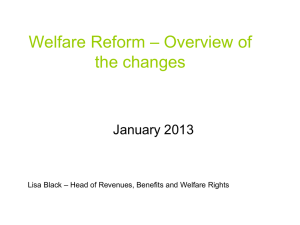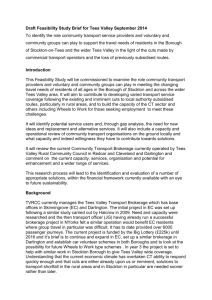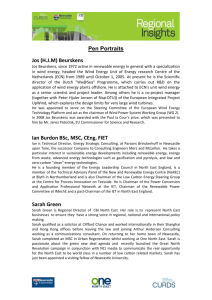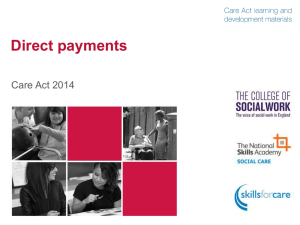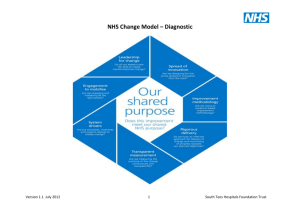Welfare Benefits Cap - Redcar and Cleveland Borough Council
advertisement
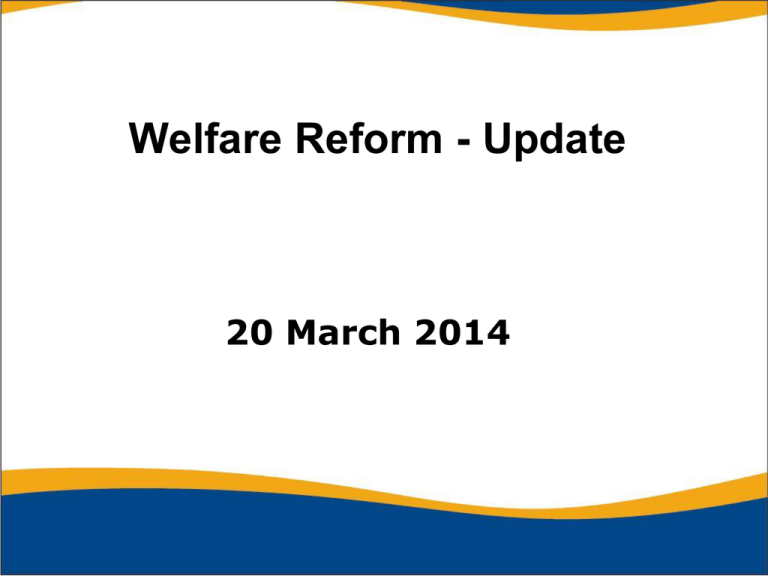
Welfare Reform - Update 20 March 2014 Background • Welfare Reform Bill - biggest shake up in welfare reform for 60 years • The Bill’s key aims are: – Create the right incentives to get people into work – Protect the most vulnerable – Deliver fairness to those claiming benefits and to the taxpayer, with the aim of ensuring no-one receives more in benefits than if they were in work Major Changes • End of Council Tax Benefit / introduction of Council Tax Support • Under occupancy (social housing) • Social Fund • Personal Independence Payments • Welfare Benefits Cap • Universal Credit Council Tax Support • Council Tax Benefit – abolished from 1 April 2013 and replaced by Local Council Tax Support. • Pensioners cannot be disadvantaged • No major challenges to scheme throughout Tees Valley • All Tees Valley Authorities now adopted a scheme and reviewed content for year 2. • For 2014/15, all Tees Valley LA’s charging 20% Council Tax (unaltered from 2013/14) apart from Hartlepool who are charging 12% (8.5% in 2013/14) • Payments required from people of working age Under occupancy within social rented sector • Reductions in benefit introduced for Registered Social Landlords from 1 April 2013 if a tenant has a “spare” bedroom • Size criteria similar to private sector, although the shared accommodation rate for under 35’s does not apply. • Significant increase in Discretionary Housing Payment applications (300% increase in awards for Middlesbrough) • HB Reductions are 14% (1 spare room) and 25% (2 spare rooms) • Exemptions include pensioners and those in temporary or supported accommodation • Legal challenges to regulations – (01 January 1996 cases as an example) Social Fund • Two elements (crisis loans and community care grants) abolished from 1 April 2013. • Councils can decide whether to operate a replacement scheme and given complete discretion over how to operate and the criteria for awards. • Schemes working well – biggest change is no cash payments throughout Tees Valley • Currently grant funded – central government announced funding to end 31.03.15 • All Tees Valley Authorities operating a local provision – all awards are a grant payment (apart from Redcar & Cleveland who ask for repayment of award over £200) • Reduced number of crisis applications when compared to DWP – providing actual items as opposed to cash payments therefore only those in genuine need applying Personal Independence Payments • Disability Living Allowance being replaced by Personal Independence Payments for 16 to 64 year olds • New scheme has to be 20% cheaper than old benefit being replaced • New Claims from April 2013 • Existing claimants reviewed from 2015 • Claimants with lifetime or indefinite award will be affected • DWP writing to everyone affected. Welfare Benefits Cap • Allow benefit up to a maximum of £26k per annum • Restrict Benefit cap of £350 (single) and £500 (couples) • No Cap applies if the household receives Working Tax Credit, Attendance Allowance or Disability Living Allowance. • Initially implemented from April 2013 in 4 London Borough’s • Phased roll out to rest of country by September 2013. • Cap only imposed on housing benefit at present. Some may lose more benefit when full cap introduced in Universal Credit. • Working with residents to mitigate impact of benefit cap where possible • Queries / impact not as significant on Benefit Service as was anticipated • Middlesbrough highest number of cases affected in Tees Valley (140 at present) Universal Credit • Introduced on a small scale in 2013 for out of work claims in pilot areas • One monthly payment, in arrears, paid directly into their bank account • Replaces Housing Benefit, Income Support, Child Tax and Working Tax Credits, Jobseekers Allowance (income based) and Income Related Employment Support Allowance • Intention is to migrate all 12 million national cases on a phased basis by 2017/18. Some cases will stay with LAs after that date. • “Digital by default” - Individuals expected to manage their own claims online and report all changes in their circumstances • Majority of payments made to the customer – only in exceptional circumstances will housing costs be paid direct to their landlord • Pilots testing different rent arrears trigger figures • Guidance on personal budgeting support published • www.dwp.gov.uk/ucla Any questions?




